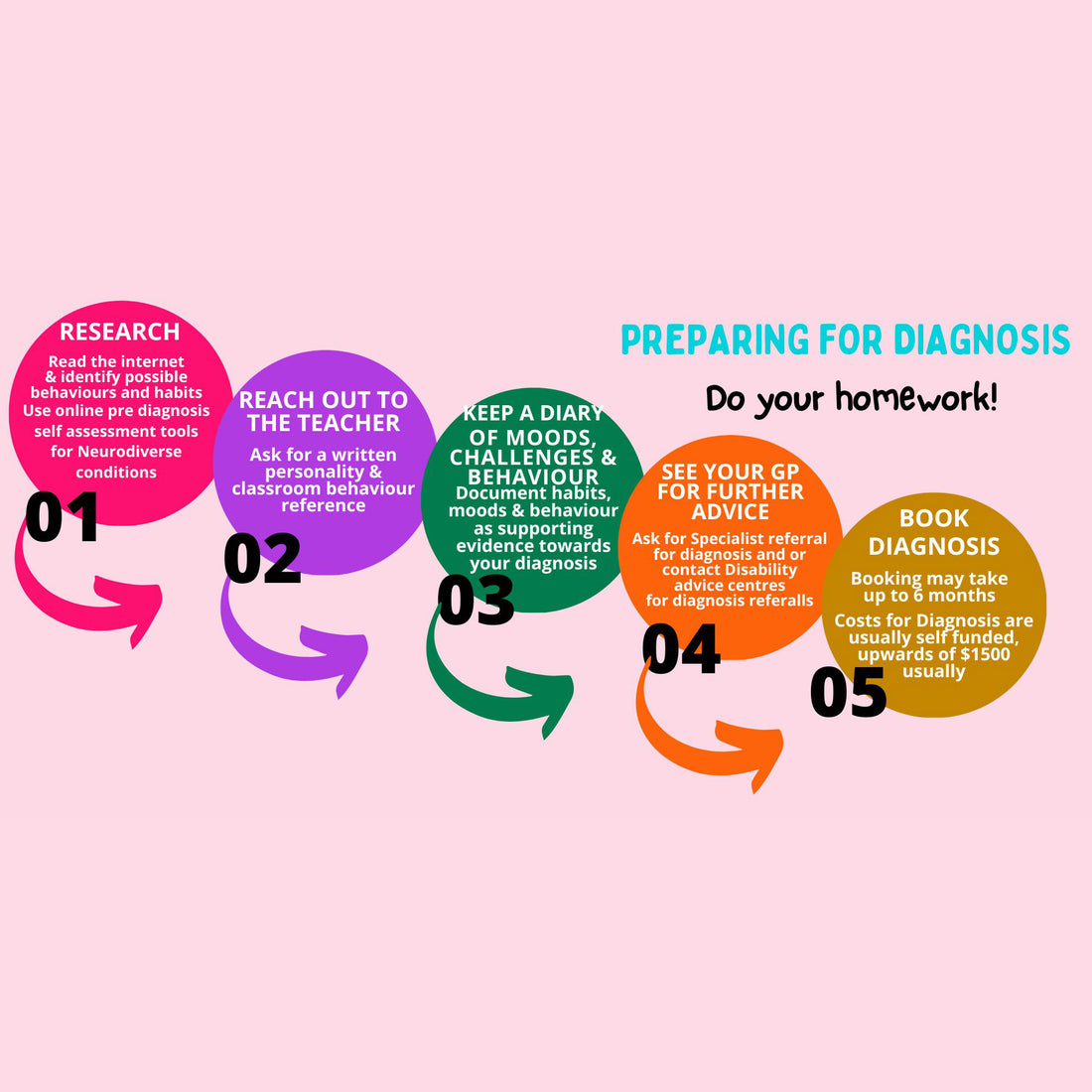Preparing for a Specialist's diagnosis
OK so you've figured out something is unique with your child, they may have global developmental delay, meltdowns, and after some self directed ‘google’ research, is showing signs of Physical and or Intellectual Disabilities. Some conditions are obvious, Cerebral Palsy, and other Physical Disabilities, some not so much- lower needs Autism, ADHD.
The first step to getting assistance and access to support services is to get an official diagnosis for your child.
Your GP is usually the 1st port of call to refer you to a specialist, they might be a Paediatric Pyschologist, or a Psychologist specialising in Autism or ADHD, or other neurological or physical conditions. Taikura Trust is also a great organisation to reach out to for free advice and recommend specialist referrals.
Preparation is key to getting an accurate diagnosis and here are some suggestions for the best outcome.
Do your homework- Before you seek a diagnosis
Some physical or intellectual conditions are self evident, eg Cerebral Palsy, Neurological/genetic conditions, while others are more subtle and complex behaviour and mood based conditions where your child may sit on a 'Spectrum'.
Self Directed Research
Start researching the internet beginning with your childs behaviours, moods, challenges and or routines- This can give you a first impression of what kind of condition your child may have.
There are some handy online self assessment tools that can help give you some indicators to you or your childs condition. They aren't intended for diagnosis- just helping you highlight a set of behaviours. Here are some below.
ASD Autism Spectrum self assessment tool for children
ADHD self assessment screening tool
Intellectual Disability IQ self assessment test
Before a diagnosis, talk to your childs ECE/Kindie or Teacher about it and they may provide you with a supporting letter, describing your childs interactions and experiences in class. Not only are you learning more about your child, you are also gathering evidence to support a more accurate diagnosis.
Document Your Childs behaviour in a diary
Documenting behaviours, challenges and habits in a diary adds weight to your observations, and assists in the diagnostic process and credibility.
Frustratingly, the booking time for a diagnosis usually takes some time (up to 6+ months) and usually at a cost (It can be upwards of $1500) , so use the time to gather any accompaning evidence to help strengthen and support the outcome of the diagnosis.

What you need to know-
Whaikaha and Disability Funding Support-
Whaikaha (Ministry of Disabled People) is a government entity that works in partnership with the Disabled community in NZ, and facilitates Disability funding support. There is strict qualifying criteria to this Disability funding support umbrella as to whether you or your child’s condition falls under or is outside of this umbrella, and you or your childs diagnosis will determine this outcome.

So what are the criteria for recieving Disability Support?
According to Whaikaha’s (ministry of Disabled People) definition of it's criteria is 'To have physical, Intellectual, or Sensory disabilities including Autism, or a combination of these which is likely to continue for at least six months, needs ongoing support to live independently, to the extent that ongoing support is required'.
As mentioned earlier some of the mentioned conditions are self evident, eg Cerebral Palsy, so Neurological/genetic conditions, others your child may exist on a 'Spectrum' and especially rely on the diagnosis to qualify for funding support.
Something to be aware of is that a diagnosis will often cross a variation different disabilities, so its possible, for example, to have Autism, physical disabilities and exhibit ADHD conditions, or have ADHD with sensory processing disorders associated with Autism. If your child is diagnosed for example with ADHD on its own, that does not qualify them to access disability support funding as ADHD is not under the disability umbrella, so hence gathering evidence to support an accurate diagnosis and choosing the recommended specialists for a diagnosis is important.
Other funding Options?
There are other means of applying for support and funding, but many organisations that offer this are often self funded charity organisations, (not funded by Whaikaha) with their own prerequisites for approval, usually operating in certain regions of NZ, and often the applicant must have already tried to recieve disability funding first.
For this reason, this infohub has chosen to focus on the process of attaining Individualised funding, under the criteria of Disability funding.


